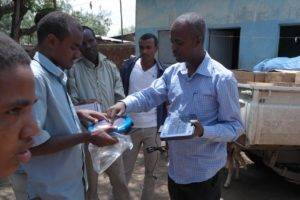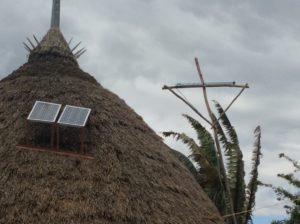Yonas Workie, Managing Director, Suntransfer Tech PLC
Location: Addis Ababa, Ethiopia
“You have to really find quality products in a market which can be unfair”
Doing business in Ethiopia, which has a population of 100 million, has its challenges. 80% live in rural areas, and hydropower is the most popular energy source. Yonas Workie has spent eight years working in solar, a fledgling alternative industry in Ethiopia; however, materials have to be imported, there is a lack of access to finance and hard currency , not to mention significant issues with the market. “There are some unfair situations, with substandard illegal and contraband products coming in,” says the founder and managing director of Suntransfer Tech. Currently, 1.5 million homes are without electricity in rural Ethiopia. “You have to constantly find quality products and services. This also affects the competition – we all struggle with the same demands.”

In his previous role with the German NGO Solar Energy Foundation, Workie distributed solar home systems; working with rural people, doing after sales services, providing credit facilities amongst others. The industrial engineer was inspired to apply this experience to a business setting with two other colleagues. Having spent eight years in the growing solar industry, mainly with private companies, launching a social business was a logical next step.
Suntransfer Tech started with selling small solar lanterns in 2012, and has graduated to servicing home systems. The most popular of the six main items items are lanterns with a four-light system, with a phone charging element, and small solar televisions. The team also partner on projects for NGOs, working on portfolios such as solar water pumps. “If a company wants to design a kilowatt system, we design and install it.” Water pumping is a big issue, says Workie. “People are more aware of this now because the government is more involved in renewable energy, but there are some bottlenecks in different channels – corruption and bureaucracy. They remain expensive. We are not promoting them individually, but reaching out to local NGOs or smaller companies.” Workie is also hoping for a wider solar association, an equal platform for people in the market, to also hold the government to account.

After almost five years, the team has doubled in size, with a network of technicians who join the team on a freelance basis. Thanks to a 2014 grant from USAID, the team were able to distribute solar home systems in the populous Southern region. “We’re trying to distribute in Oromia and Amhara now. We are trying to replicate the funding situation at the moment, and get loans from small banks which is not easy, since they request collateral, which we don’t have as a young company.” Working with the Solar Energy Foundation in Germany means that the team at least has a partner who can help with applying for loans and try to expand the business.

Workie’s team has been promoting solar in more villages, through micro finance institutions whose customers include farmers. “We teach people how the products and technology work. People have been using kerosene lamps and wood for fire, so it’s life changing for them – I mean, to see light from solar, or see a TV running on solar. They’re happy, but the affordability of buying such products in cash is limited. This is why micro finance plays such a big role, since they provide credit. These are the end users we are trying to reach.” Workie joined the sector by chance, he says, and sees hope for the future, despite the testing market his team operates in. “Ethiopia has huge potential; just look at any map, or international rankings – we are north of the equator, and can do a lot with our sun.”
–Nabeelah Shabbir, @lahnabee




